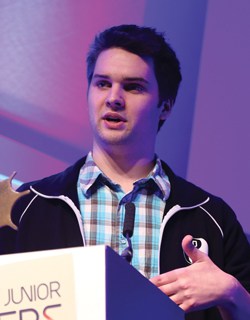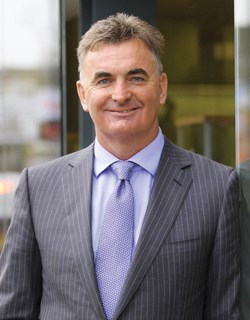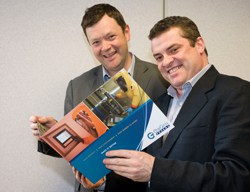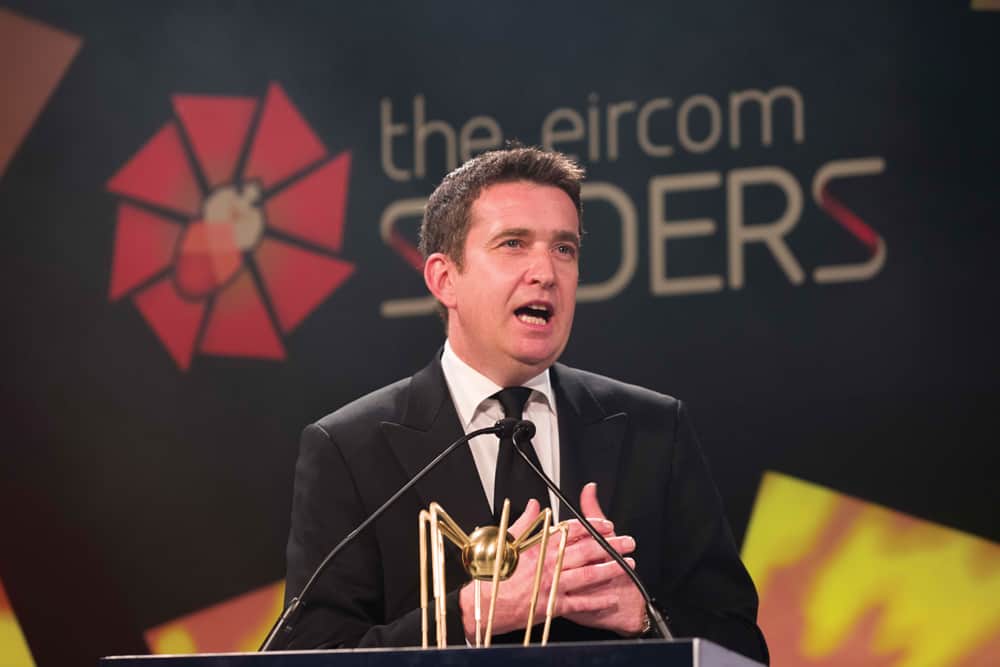Mark Little pictured at last year’s eircom Spider Awards
Niamh Mac Sweeney looks at some of Ireland’s leading entrepreneurs and trail blazers, charting their journey from early stage enterprise to fast growth company.
As we move beyond a period of economic instability towards one of growth and investment, entrepreneurs driving indigenous enterprises will be central to Ireland’s continuing recovery.
Innovation and creativity are easily identified in some of Ireland’s leading entrepreneurs, and there are many examples of those who provide compelling products, processes and knowledge based-solutions while competing on a global stage and within constantly changing markets.
Not only are these inspiring enterprises contributing to the economy, providing innovative products and services and creating employment, but they are also adding to our strong international reputation as a great place to start, grow and export a business from.
SOCIAL STORY
When the world’s first social news agency was established, few would have thought it was an Irish-based company, especially given that Storyful was almost an instant global brand.
Its founder, Mark Little – an Irish journalist, television presenter and author – took time out from working at RTÉ to pursue a project centred on digital media and global journalism, and in 2010, Storyful was born.
Fast-forward three years and Storyful became the Irish entrepreneurial success story of the year when it was sold to Rupert Murdoch’s News Corp for €18m.
Since it was acquired, Storyful has grown to almost 90 people, in Dublin, New York, London, Hong Kong, Atlanta and Sydney.
In June this year, writing on the Storyful blog, Mark Little announced his decision to leave the company, which he admitted was not an easy decision, but was the correct one.
“Storyful was an unlikely story from the beginning,” he said. “I founded the company because I wanted to prove that the eternal values of quality journalism mattered more than ever in the age of social media. And I was determined to prove that the very best journalism is still a great business model.”
According to Little, the journey for the early stage enterprise was “exhilarating, exhausting, relentless and sometimes dispiriting”. He added: “When we first pitched our product, I could see the eyes of some potential clients glaze over as they struggled to understand our relevance. So the global success of our company is the sweetest feeling.”
While Little says his departure from Storyful is proof of the strength of the company, when Storyful was acquired by News Corp in 2013 he remained on to ensure the company’s core values were enhanced rather than undermined.
“Acquisitions are notoriously messy affairs (at least for the start-up). But that hasn’t been the case with Storyful and News Corp. We’ve enjoyed absolute and unwavering support for our ambitions from the highest level at News Corp, and also received the resources to achieve them. We acquired the talented Rahul Chopra from News Corp, and, as Storyful’s CEO, he has all the right skills to guide Storyful to a glorious second act.”
When the world’s first social news agency was established, few would have thought it was an Irish company
IN THE BAG
Another prime example of an indigenous media enterprise with huge growth and export potential is Brown Bag Films which was established in 1994 by Cathal Gaffney and Darragh O’Connell. Brown Bag Films produce animated children’s programmes and over the past 15 years, the company has grown from two staff in 1994 to more than 50 employees at its offices in Dublin, the UK and the US.
Although Brown Bag are well known here in Ireland, equally 90% of their business is export-based and programmes produced by the animators are watched by millions of children around the world every day. After 21 years in business, Brown Bag’s Dublin-based headquarter continues to produce cutting-edge animation for the international market, bagging numerous awards along the way.
The company has worked with some of the world’s biggest entertainment names, including Disney, Nickelodeon, BBC, Chorion, Silvergate Media and Amazon Studios. The company recently partnered with publishing house Scholastic UK to jointly develop publishing and animated content.
CODE CRACKERS

James Whelton
One entrepreneur who began his journey as a teen was James Whelton, who founded the now infamous CoderDojo at the tender age of 18. Since then, the Cork native has blazed a trail and what started a simple mission to get as many children coding as possible, has today become the CoderDojo movement – a not-for-profit organisation where, through a network of volunteers and kids teaching other kids, there are more than 480 dojos operating in 48 countries worldwide. Within Europe alone, CoderDojo classes reach more than 25,000 students.
THE GAMESMASTER
An equally ambitious digital entrepreneur is Dylan Collins. He founded DemonWare in 2003, growing it to become the leading online games technology firm in the global console games market.
DemonWare was acquired by Activision Blizzard – the world’s biggest video games publisher – in 2007.
Not content to retire on the proceeds, the serial entrepreneur founded Jolt Online Gaming, which became one of the pioneering social games publishers in Europe. Jolt was then acquired by GameStop, the largest video games retailer in the world in 2009.
Collins is now CEO of SuperAwesome, the number one children’s marketing platform in the US and UK, reaching over 20 million children every month. SuperAwesome works with the biggest children’s entertainment brands in the world including Disney, Hasbro, Warner Bros and Activision.
Collins is also an investor and advisor across children’s media and technology companies and is a venture partner with Hoxton Ventures. He also sits on the board of the UK’s top-rated marketing technology agency, Potato.
The next generation of digital entrepreneurs need look no further for inspiration than Collins. His drive is unrelenting and he is a shining example of how an Irish established company can start, grow, garner massive global reach, and fairly quickly, sell for millions of dollars.
WAY TO GO
Another ambitious entrepreneur in the IT industry is John Purdy, who co-founded Ergo more than 20 years ago. Ergo is one of Ireland’s most successful IT companies, and has transitioned from a firm focusing on the sale of IT commodities to providing software solutions and IT infrastructure services to multinational customers.
June 2013 saw Ergo celebrate 20 years in business, and since it was founded, Ergo has grown from three to over 200 employees. Despite the pace of change in this industry, over the last five years, Ergo has accelerated its cloud and managed services offering, carving out an important role in next-generation ICT service delivery.
FINTECH FOUNDERS

Brian Conlon
Another astute entrepreneur is Brian Conlon, the founder of First Derivatives – a leading global service provider in the capital markets technology sector with offices in New York, London and Ireland.
Since its establishment, First Derivatives has been on a fast growth journey and this year alone the company has been strategic with its investments. Recently, First Derivatives purchased a majority stake in Kx Systems and subsequent investments across the business include three acquisitions in as many months.
First Derivatives has positioned itself as a leading player in ‘big fast data’ across multiple vertical markets and there is a sense that there will be a number of key investments from the company that will maximise the growth potential of the business, future-proofing it for a long time to come.
Colm Lyon is no stranger to the business community in Ireland. He founded Realex Payments in 2000 and over the last decade has transformed the company into one of Europe’s largest and fastest growing online payment gateways, processing in excess of €28bn per annum on behalf of 12,500 clients.
In March this year, Lyons announced that the firm had been acquired by Global Payments, a leading worldwide provider of payment technology services.
According to Lyons: “It’s great news for our customers, for our employees, and for Ireland. For Realex Payments’ existing 12,500 merchants, this deal means they can avail of Global Payments’ unmatched international presence, entering new markets and driving their global ecommerce business like never before. And for Realex Payments’ staff, the diversity of opportunity that comes with the deal is enormous.”
Global Payments conducts business in 28 countries, with 4,200 employees across the globe. “This is another great news story for Ireland. Going forward, the company will be at the heart of ecommerce for a Fortune 1000 company that services over 1.5 million merchants,” Lyons added.
BREATHING LIFE INTO SCIENCE

Patsy Carney and Tom Brennan
There is no shortage of life science companies setting up in Ireland, and while global multinationals are the cornerstone of the industry here, indigenous science-based enterprises are preforming strongly and holding their own too.
Building a hugely successful pharma company from start-up status 10 years ago, to its recent sale worth $135m, Patsy Carney and Tom Brennan, co-founders of EirGen, have shown their commitment to investing in Ireland, its people and the industry in general.
Last year EirGen created 40 new jobs following a €4m investment, and this year the company has been sold to US-based Opko for $135m (€120m). Opko’s CEO, Philip Frost said the main reason they were interested in EirGen was because it is one of the leading developers and suppliers of high-potency niche pharmaceutical products in the world.
Co-founder and chief technical officer, Tom Brennan, said: “Official figures show that the life sciences sector is the fastest growing area of Ireland’s export industry.
“We hope that our continuing efforts will inspire other high-end technology companies to invest – and re-invest – in the region, providing further opportunities for employment growth while driving forward efforts to secure Ireland’s future as the location-of-choice for world-leading research and manufacturing industries,” he continued.
Julie Sinnamon, CEO, Enterprise Ireland said: “EirGen Pharma is a stand-out example of an ambitious, innovation-led Irish company that is achieving strong export-led growth.”
FOOD FOR THOUGHT
The Irish food and agri sector is worth €24bn to the Irish economy annually and according to PwC, there are approximately a quarter of a million people who contribute their skills, know-how and hard work to drive the success and reputation of Ireland as a place of quality food and agribusiness.
With so many food companies, from creative start-ups to established firms performing strongly in both domestic and international markets, it’s impossible to single out just a few companies of note.
Irish food and agribusinesses are benefiting from Ireland’s stellar global reputation, and in 2014, exports grew by 4%, representing an expansion of 45% or €3.2bn since 2009. The strongest performing sectors were dairy product and ingredients, which exceeded the €3bn mark (+3%), prepared foods (€1.8bn, +8%) and seafood (€540m, +8%).
CAPTURING GLOBAL MARKETS
Aidan Cotter, chief executive, Bord Bia highlighted the significant shift in the destinations for Irish exports, with international markets showing renewed growth, reflected in a 15% increase in trade to stand at €3bn, or 29% of total food and drink exports.
“The industry’s drive to broaden export reach to destinations outside of the EU is paying dividends, with growth in emerging and international markets now driving export figures, offsetting the limited growth in our established premium EU markets,” he said.
There are many examples of inspiring start-ups that have grown and succeeded in capturing global markets. As a place to start, grow and export from, Ireland has many positives. Maximising on these further will impact positively on the enterprise community and will bolster our international reputation as a great place to start, grow and export a business from.







